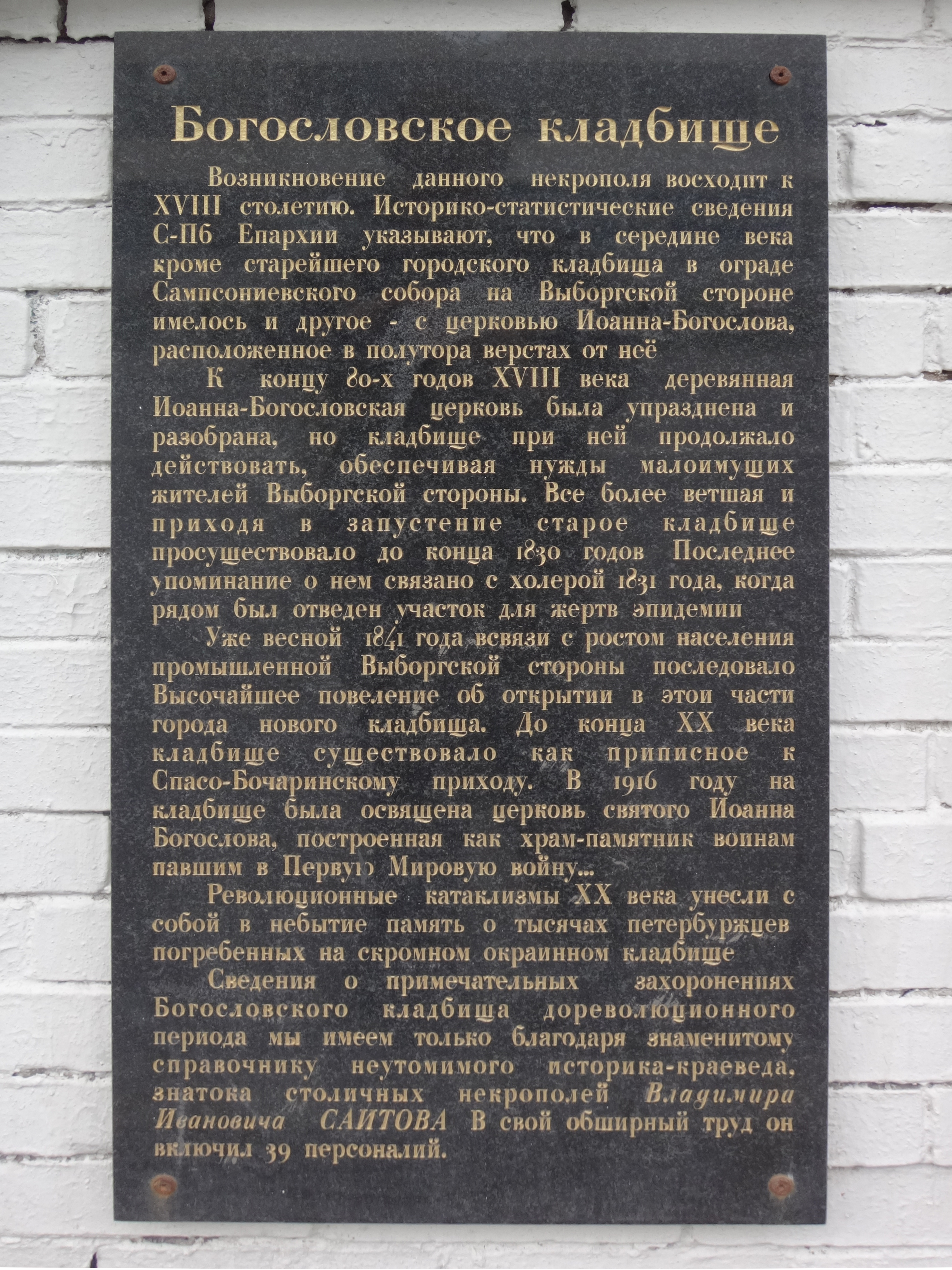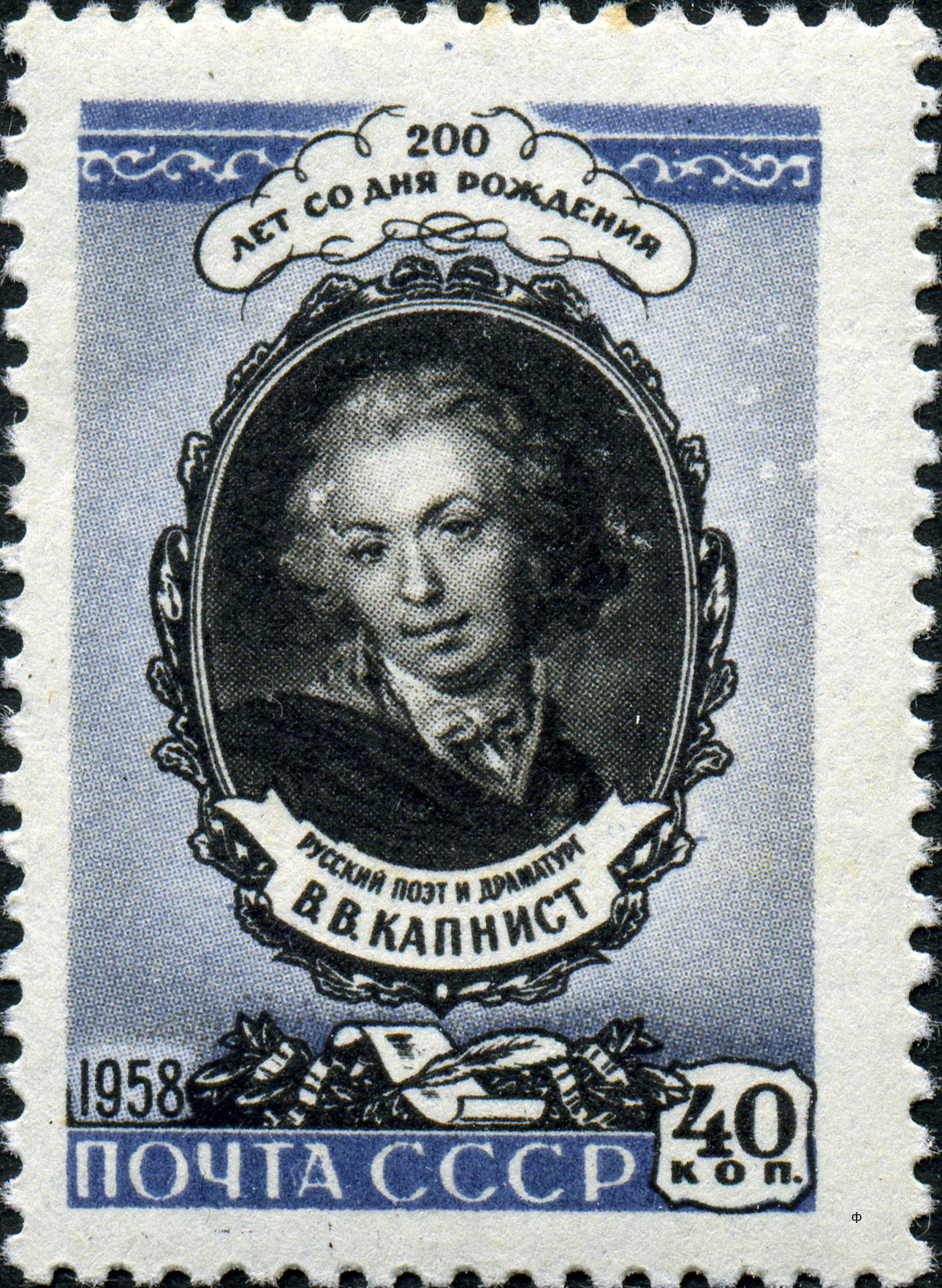|
Vladimir Saitov
Vladimir Ivanovich Saitov (June 17, 1849, Saint Petersburg – January 29, 1938, Leningrad) was a Russian bibliographer and literary historian, secretary of the Imperial Russian Historical Society (1916). Active State Councillor, Actual State Councilor (1916). Biography He studied at the The Second Saint Petersburg Gymnasium, 2nd Saint Petersburg Gymnasium, graduated from the 5th grade, left the gymnasium due to illness in 1867, after which he took up self-education. He began his creative activity in 1875: he collected and described literary and historical monuments, since 1877 he published articles. Since 1888, he served in the National Library of Russia, Imperial Public Library as an assistant librarian of the Russian language book department, with work in which all of Saitov's further activities were connected (with a break from 1893 to 1899). In 1909, he headed this department, in 1916 he was granted the rank of acting state councilor. Since 1928, in which Saitov retired, the ... [...More Info...] [...Related Items...] OR: [Wikipedia] [Google] [Baidu] |
Saint Petersburg
Saint Petersburg ( rus, links=no, Санкт-Петербург, a=Ru-Sankt Peterburg Leningrad Petrograd Piter.ogg, r=Sankt-Peterburg, p=ˈsankt pʲɪtʲɪrˈburk), formerly known as Petrograd (1914–1924) and later Leningrad (1924–1991), is the second-largest city in Russia. It is situated on the Neva River, at the head of the Gulf of Finland on the Baltic Sea, with a population of roughly 5.4 million residents. Saint Petersburg is the fourth-most populous city in Europe after Istanbul, Moscow and London, the most populous city on the Baltic Sea, and the world's northernmost city of more than 1 million residents. As Russia's Imperial capital, and a historically strategic port, it is governed as a federal city. The city was founded by Tsar Peter the Great on 27 May 1703 on the site of a captured Swedish fortress, and was named after apostle Saint Peter. In Russia, Saint Petersburg is historically and culturally associated with t ... [...More Info...] [...Related Items...] OR: [Wikipedia] [Google] [Baidu] |
Alexander Turgenev
Alexander Ivanovich Turgenev (russian: Алекса́ндр Ива́нович Турге́нев; (27 March April1784, Simbirsk - 3 5December 1845, Moscow) was a Russian statesman and historian. Biography Alexander Turgenev was born in Simbirsk in 1784. His father, Ivan Petrovich Turgenev (1752-1807) was one of the most enlightened men of his time. Alexander was educated at Moscow University, where he met the poet Vasily Zhukovsky; they formed a friendship that lasted until the death of Turgenev. From 1802 to 1804 he studied history and political science at the University of Göttingen, and then traveled with his friend Andrey Kaisarov. He served in the Ministry of Justice, took part in the work of the commission to formulate laws, and accompanied the Tsar, Alexander I abroad in 1810. Afterwards he was appointed Director of the Department of the General Directorate of Religious Affairs of Foreign Faiths; at the same time he was made an assistant secretary of the State Cou ... [...More Info...] [...Related Items...] OR: [Wikipedia] [Google] [Baidu] |
Bogoslovka 3
Bogoslovka (russian: Богословка) is the name of several types of inhabited localities in Russia, rural localities in Russia. Modern localities *Bogoslovka, Ivanovsky District, Amur Oblast, a ''village#Russia, selo'' in Andreyevsky Rural Settlement of Ivanovsky District, Amur Oblast, Ivanovsky District in Amur Oblast *Bogoslovka, Mazanovsky District, Amur Oblast, a ''selo'' in Bogoslovsky Rural Settlement of Mazanovsky District in Amur Oblast *Bogoslovka, Gubkinsky District, Belgorod Oblast, a ''selo'' in Gubkinsky District of Belgorod Oblast *Bogoslovka, Krasnensky District, Belgorod Oblast, a ''selo'' in Gorkinsky Rural Okrug of Krasnensky District in Belgorod Oblast *Bogoslovka, Republic of Khakassia, a village#Russia, village under the administrative jurisdiction of the City of federal subject significance, Town of Sayanogorsk in the Republic of Khakassia *Bogoslovka, Kursk Oblast, a village in Klevensky Selsoviet of Khomutovsky District in Kursk Oblast *Bogoslovka, Nizh ... [...More Info...] [...Related Items...] OR: [Wikipedia] [Google] [Baidu] |
Bogoslovka 2
Bogoslovka (russian: Богословка) is the name of several rural localities in Russia. Modern localities * Bogoslovka, Ivanovsky District, Amur Oblast, a '' selo'' in Andreyevsky Rural Settlement of Ivanovsky District in Amur Oblast * Bogoslovka, Mazanovsky District, Amur Oblast, a ''selo'' in Bogoslovsky Rural Settlement of Mazanovsky District in Amur Oblast * Bogoslovka, Gubkinsky District, Belgorod Oblast, a ''selo'' in Gubkinsky District of Belgorod Oblast * Bogoslovka, Krasnensky District, Belgorod Oblast, a ''selo'' in Gorkinsky Rural Okrug of Krasnensky District in Belgorod Oblast * Bogoslovka, Republic of Khakassia, a village under the administrative jurisdiction of the Town of Sayanogorsk in the Republic of Khakassia * Bogoslovka, Kursk Oblast, a village in Klevensky Selsoviet of Khomutovsky District in Kursk Oblast * Bogoslovka, Nizhny Novgorod Oblast, a village in Volzhsky Selsoviet of Sokolsky District in Nizhny Novgorod Oblast * Bogoslovka, Karasuksky ... [...More Info...] [...Related Items...] OR: [Wikipedia] [Google] [Baidu] |
Bogoslovskoe Cemetery
Bogoslovskoe Cemetery (russian: Богословское кладбище) is a cemetery in Saint Petersburg, Russia. It is located in the Kalininsky District of the city between and . The name comes from the church of John the Apostle, (russian: Иоанн Богослов, Ioann Bogoslov), which from the early 18th century had a burial ground attached, mostly for those who died in the nearby military hospital. This site was some 2.5 km south of the present cemetery, at what is now the intersection of and . The church and cemetery were closed in 1788 and the land sold off into private ownership. In 1841 the city acquired a new plot of land for a cemetery, and named it after the previous one. In 1844, the Most Holy Synod approved the building of a new stone church, but no funds were available. In 1853-1854 a small two-storey chapel was built. In 1915–1916, a new wooden three-fronted church of John the Apostle was built at the cemetery to the design of architect . The c ... [...More Info...] [...Related Items...] OR: [Wikipedia] [Google] [Baidu] |
Iconography
Iconography, as a branch of art history, studies the identification, description and interpretation of the content of images: the subjects depicted, the particular compositions and details used to do so, and other elements that are distinct from artistic style. The word ''iconography'' comes from the Greek ("image") and ("to write" or ''to draw''). A secondary meaning (based on a non-standard translation of the Greek and Russian equivalent terms) is the production or study of the religious images, called "icons", in the Byzantine and Orthodox Christian tradition (see Icon). This usage is mostly found in works translated from languages such as Greek or Russian, with the correct term being "icon painting". In art history, "an iconography" may also mean a particular depiction of a subject in terms of the content of the image, such as the number of figures used, their placing and gestures. The term is also used in many academic fields other than art history, for example semiotics ... [...More Info...] [...Related Items...] OR: [Wikipedia] [Google] [Baidu] |
Leon Trotsky
Lev Davidovich Bronstein. ( – 21 August 1940), better known as Leon Trotsky; uk, link= no, Лев Давидович Троцький; also transliterated ''Lyev'', ''Trotski'', ''Trotskij'', ''Trockij'' and ''Trotzky''. (), was a Russian Marxist revolutionary, political theorist and politician. Ideologically a Marxist, his developments to the ideology are called Trotskyism. Born to a wealthy Jewish family in Yanovka (now Bereslavka, Ukraine), Trotsky embraced Marxism after moving to Mykolaiv in 1896. In 1898, he was arrested for revolutionary activities and subsequently exiled to Siberia. He escaped from Siberia in 1902 and moved to London, where he befriended Vladimir Lenin. In 1903, he sided with Julius Martov's Mensheviks against Lenin's Bolsheviks during the Russian Social Democratic Labour Party's initial organisational split. Trotsky helped organize the failed Russian Revolution of 1905, after which he was again arrested and exiled to Siberia. He once again escape ... [...More Info...] [...Related Items...] OR: [Wikipedia] [Google] [Baidu] |
Korney Chukovsky
Korney Ivanovich Chukovsky ( rus, Корне́й Ива́нович Чуко́вский, p=kɐrˈnʲej ɪˈvanəvʲɪtɕ tɕʊˈkofskʲɪj, a=Kornyey Ivanovich Chukovskiy.ru.vorb.oga; 31 March NS 1882 – 28 October 1969) was one of the most popular children's poets in the Russian language. His catchy rhythms, inventive rhymes and absurd characters have invited comparisons with the American children's author Dr. Seuss. Chukovsky's poems ''Tarakanishche'' (" The Monster Cockroach"), ''Krokodil'' ("The Crocodile"), ''Telefon'' ("The Telephone") and ''Moydodyr'' ("Wash-'em-Clean") have been favorites with many generations of Russophone children. Lines from his poems, in particular ''Telefon'', have become universal catch-phrases in the Russian media and everyday conversation. He adapted the Doctor Dolittle stories into a book-length Russian poem as ''Doctor Aybolit'' ("Dr. Ow-It-Hurts"), and translated a substantial portion of the Mother Goose canon into Russian as ''Angliyskiye Na ... [...More Info...] [...Related Items...] OR: [Wikipedia] [Google] [Baidu] |
Alexander Pushkin
Alexander Sergeyevich Pushkin (; rus, links=no, Александр Сергеевич ПушкинIn pre-Revolutionary script, his name was written ., r=Aleksandr Sergeyevich Pushkin, p=ɐlʲɪkˈsandr sʲɪrˈɡʲe(j)ɪvʲɪtɕ ˈpuʂkʲɪn, a=ru-Pushkin.ogg; ) was a Russian poet, playwright, and novelist of the Romantic era.Basker, Michael. Pushkin and Romanticism. In Ferber, Michael, ed., ''A Companion to European Romanticism''. Oxford: Blackwell, 2005. He is considered by many to be the greatest Russian poetShort biography from University of Virginia . Retrieved 24 November 2006.Allan Rei ... [...More Info...] [...Related Items...] OR: [Wikipedia] [Google] [Baidu] |
Vasily Pushkin
Vasily Lvovich Pushkin (russian: Васи́лий Льво́вич Пу́шкин; 27 April 1766 – 20 August 1830) was a minor Russian poet best known as an uncle of the much more famous Alexander Pushkin. Vasily Pushkin was born in Moscow, Russian Empire. During his early years, he served in Russia's Leib Guard Izmailovo Regiment, retiring with the rank of poruchik. Between 1803 and 1804 Pushkin lived abroad, mainly in Paris, France, Paris. Pushkin was a Neoclassicism, neoclassical poet and was indifferent to the then-popular romantic poetry, romantic movement. In his poem "Captain Khrabrov", Pushkin mocked romanticism. He was a follower of light poetry, and wrote numerous songs, epistles, and epigrams in the manner of Horace, Tibullus, or Catullus. He also translated several poems of Jean de la Fontaine, La Fontaine and other French poets. Vasily Lvovich had a sudden burst of creativity in 1810 and 1811, when he wrote his best polemical verse, including a humorous masterpiec ... [...More Info...] [...Related Items...] OR: [Wikipedia] [Google] [Baidu] |
Vasily Kapnist
Count Vasily Vasilievich Kapnist (russian: Василий Васильевич Капнист, 23 February 1758 – 9 November 1823), was a Russian poet, playwright and nobleman who was known as an active critic of serfdom in Russia and as a proponent of restoration of the Zaporozhian host in the region of southern Ukraine. Life and work Kapnist was born in Velikaya Obukhovka in the Kiev Governorate of the Russian Empire in 1758. According to family tradition, Kapnist's mother was a captive woman of Turkish origin. His paternal grandfather was a Venetian merchant of Greek origin from the island of Zakynthos. He was a descendant of the Venetian noble family of Capnissi (whose name derives from the Zakynthos surname Καπνίσης), he spent all his life in the manor of Obukhovka near Poltava. His lifelong friendship with Nikolay Lvov and Gavrila Derzhavin date from the early 1770s, when all three served in the Leub Guard. Derzhavin later married Kapnist's sister-in-law and ... [...More Info...] [...Related Items...] OR: [Wikipedia] [Google] [Baidu] |




